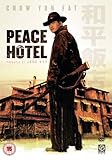Eye For Film >> Movies >> Peace Hotel (1995) Film Review
He is a man without a name, known only as The Killer. Ten years ago, after slaughtering the gang that caused the death of his beloved - periodically rerun as black-and-white flashbacks - he renounced his violent past and set up the Peace Hotel on the site of the massacre, as an attempt to improve his karmic balance sheet.
Take refuge there and your enemies may not enter. If they try, then The Killer will take up arms once more. Such is his reputation, however, that no one has challenged him. Until now, that is, as a woman claiming to be The Killer's long lost love arrives at the place, hotly pursued by a gang of unusually determined bandits willing to cross the line if she is not handed over to them.
This 1995 production represents something of a last hurrah for chivalry from producer John Woo and star/co-writer Chow Yun Fat - his involvement in the latter suggested this to be a more personal project - as they bade farewell to the Heroic Bloodshed genre with which they had made their names and secured their passports to Hollywood.
While certainly not likely to be remembered as either man's finest hour-and-a-half, up there with A Better Tomorrow, The Killer or Hard Boiled, the film is nevertheless an entertaining divertissement, in which director and co-writer Wai Ka-Fai shows himself to have learned the lessons of his sifu in infusing the action with emotional and moral dimensions, also giving Chow a chance to demonstrate his acting chops as much as his martial arts skills, remembering that, unlike the island's other stars, he has always been first and foremost an actor, his background being in Hong Kong TV dramas rather than Beijing Opera - Chan, Hung and various Yuens - or martial arts - Lee and Li.
Some especially enjoyable interplay between Chow and his female co-star, the often underrated Cecilia Yip, and quirky supporting players, such as three blind ex-gangsters-cum-musicians, functioning as a chorus to their relationship, adds a kind of screwball comedy element that emphasises the main weakness of Peace Hotel, in the sense that the filmmakers aren't completely sure what they want to be.
At times, it is reminiscent of the more indigenous tradition of the "inn film," as developed by King Hu in the Sixties, with the likes of Come Drink With Me and contemporaneously re-imagined by films such as New Dragon Gate Inn. At others, it is more akin to an Eastern-Western take on the themes of High Noon, Rio Bravo and The Unforgiven, with this element reinforced by a subdued and earthy colour palette and the inclusion of traditional wu xia swordplay and contemporary heroic bloodshed-style gunplay at different points in the narrative.
Likewise, the love/hate dynamic of the relationship between the two leads is never fully articulated, nor the truths of their past lives. This would be fine, if the intention was a more self-consciously intellectual film along the lines of Wong Kar Wai's Ashes Of Time, but it's not really something that plays to the creators' own distinctive strengths.
The dramatic revelation in the final act also isn't a surprise. I won't spoil it, but you can really guess it from the off; let's just say it's one of those casting decisions that, while perhaps understandable in box office terms, isn't good for the integrity of the film.
Worth a look for fans of Chow and, to a lesser degree, Woo, as long as you remember that the only thing about it that's truly Killer is its protagonist's name.
Reviewed on: 03 Jul 2006

















